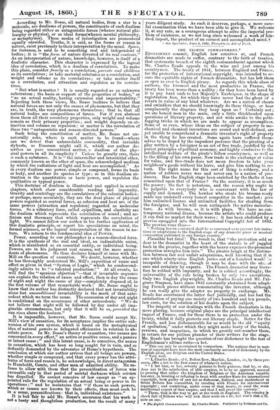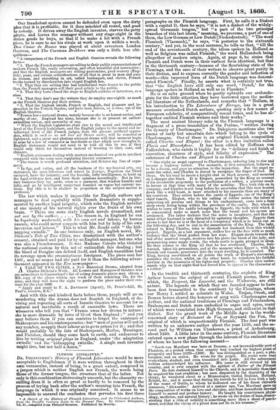THE EIGHTH COMMANDMENT.'
ACGLISHMEN commit, English law connives at, and French dramatists are made to suffer, contrary to the faith of treaties, that systematic breach of the eighth commandment against which Mr. Charles Reade appeals to the wise and just among his countrymen. The treaty of 1851, between England and France, for the protection of international copyright, was intended to se- cure the equitable rights of French dramatists, but has left them as open as ever to English piracy. As regards this whole class of authors, the foremost and the most productive in France, the treaty has been worse than a nullity ; for they have been lured by it to pay hard cash to her Majesty's Exchequer, in the shape of registration fees, for which they have never had the ghost of a return in value of any kind whatever. Are we a nation of cheats and swindlers that we should knowingly do these things, or bear complacently the disgrace they heap upon us ? Certainly not ; we are honest men in the main, only a little thickheaded upon questions of literary property, and not wide awake to the petti- fogging tricks in which we are made to appear as accomplices. Some of us even, whose ideas on the subject of property in me- chanical and chemical inventions are sound and well-defined, are yet unable to comprehend a dramatic inventor's right of property in the thing he has created. Some again have suffered them- selves to be duped by the impudent pretence that the pirating of a
i
play written by a foreigner s an act of free trade, justified by the purest principles of political economy, and highly conducive to the intellectual welfare of the pirate's fellow countrymen, as well as to the filling of his own purse. Now trade is the exchange of value for value, and free-trade does not mean freedom to take your neighbour's goods without his leave, and give him nothing in re- turn. The right name for this sort of thing is robbery, and a nation of robbers never was and never can be a nation of pro- ducers. Has the English stage been enriched by the thefts it has committed upon that of France ? On the contrary, it is so much the poorer ; the fact is notorious, and the reason why ought to
i be palpable to everybody who s conversant with the law of supply and demand. The hawker who steals his brooms ready made can undersell every honest competitor in the market ; give him unlimited licence and unlimited facilities for stealing from the foreigner, and he will soon extinguish the native manufac- ture. As with brooms, so it is with plays. We have no con- temporary national drama, because the artists who could imams it can find no market for their wares ; it has been abolished by a proviso smuggled into the International Copyright Act of 1852. The proviso runs thus-
" Nothing herein contained shall be so construed as to prevent fair imita- tions or adaptations to the English stage of any dramatic piece or musical composition published in any foreign country." Plausible but fatal! The result is, that "the protection sold so dear to the dramatist in the heart of the statute is all juggled back in the proviso, together with the heavy expenses the promised protection inveigles him into." The pirates laugh at the distinc- tion between fair and unfair adaptations, well knowing that it is one which ninety-nine English juries out of a hundred would incapable of drawing, though it may be done with the utto Jut ease and certainty by experts. The French dramatist may there- fore be robbed with impunity, and he is robbed accordingly, the universality of the rule being broken by only two exceptions. Only two English playwrights, Mr. Charles Reade and Mr. Pal- grave Simpson, have since 1852 constantly abstained from adapt- ing French pieces without remunerating the inventor, although he can really give the adapter no property in exchange. Mr. Reade has ascertained the latter fact judicially, and has had the satisfaction of paying one moiety of two hundred and ten pounds, law costs, for the solution of his doubts upon the subject.
The iniquity of our dealings with the French dramatists is the more glaring, because original plays are the principal intellectual import of France, and for these there is no protection under the treaty, whilst it fully protects our literary staple. Better for the French, and less dishonourable for us would be the old "equity of spoliation," under which they might make booty of the books, reviews, and magazines, in which we greatly out-number them, in return for our pitiless plunder of their writers for the stage. Mr. Reade has brought the question of our dishonour to the test of Englishman's ultima ratio—a bet.
"This can only be ascertained by comparison. The nations that in mat- ters of copyright have been the most constantly accused of dishonesty by the English press, are Belgium and the 'United States. "Very well.
" ' I, Charles Reade of 6, Bolton Row, Mayfair, London, do, by these pre- sents, offer a bet to the first corner of whatpver nation. " I bet him, or her, seventy guineas to forty guineas, that he, or she, does not to the satisfaction of able umpires, to be by us approved, succeed in proving that either the kingdom of Belgium or the American republic has ever, in treating or refusing to treat with another State for international copyright, been guilty of any act as dishonest, disloyal, and doublefaeed as Great Britain has committed, by treating with Fiance for international copyright ; and contriving, under cover of that treaty, to steal the main intellectual export of that empire and that I will prove the contrary.' "There, that is the way to get at the truth in England. The country * chock full of fellows who will risk their souls on a he, but won't ruka,51. note on one."
• The Eighth Commandment. By Charles Beside. Published by Tritium arid Co. Our fraudulent system cannot be defended even upon the dirty plea that it is profitable, for it does-mischief all round, and good to nobody. It drives away the English inventor, starves the petty pirate, and leaves the manager without any stage-right in the stolen goods he buys, so that if he make a hit with a French piece, he is sure to see his rivals at work upon it within a week. Don Casar de Bazan was played at about seventeen London theatres, and The Corsican Brothers was only a little less ubi- quitous— " A comparison.of the French and English theatres reveals the following facts-
" 1. That the French managers are selling to their public representations of modern French life, really interesting, and often beautiful and instructive ; and that the English managers are selling pantomime, good scenery (Eng- lish), puns, and certain ordurifioations of all that is great in man and pure in woman and ennobling in art, called burlesques, and clever, French truths-turned by discoloration into stupid English lies. "2. That they arc selling this bad intellectual ware dearer to the public than the French managers sell their good article to the public. "3. That they have closed the stage to English authors or inventors, as a °lass.
"4. That they don't pay the writers they do employ one-eighth as much as the French theatres pay their writers.
"5. That the highest minds, French or English, find pleasure and in- struction in the French theatre, and have been driven, as a class, out of the
English theatres. • • •
"France has a national drama, mainly because she is an honest nation, and worthy of one. England has none, because she is at present an author- swindling nation, and unworthy of one. "When the English legislature shall rise to the moral and intellectual level of the French legislature, and the English judges to the moral and in- tellectual level of the French judges, then the present artificial oppres- sion which is such as no art ever yet throve under, will be removed or lightened, and a great and glorious national drama will that moment begin to arise by a law of commerce as inevitable as that which now strangles it. English statesmen would not need to be told all this by me, if they would only think for themselves instead of trusting to rant, cant, and chimera.
"English statesmen dealing with matters mechanical are gods in intellect
compacompared with the same men regulating literary commerce,. " red reason is worth profound attention, and dictates my line of argu-
ment.
"In figs, and cotton, and all the business of the mechanical arts, our statesmen, the most laborious and wisest in Europe Napoleon the Third excepted, have the industry, and the humble, lofty in
telligence, to hunt up the legal evidence first, and form their opinions accordingly. But in lite- rary business they lay aside, -even as a garment, that wisdom humble and lofty, and go by intelligent conjecture founded on vague but current no- tions. But this is to be shallow in proportion as the subject matter is profound."
The law which makes it impossible for English authors and managers to deal equitably with French dramatists is supple- mented by another legal iniquity, which robs the English novelist of one moiety of his natural rights over the fruits of his own brain. "There are some sixty English novels dramatised, and not one by the author. . . . . The reason is, in England he can ba hopelessly undersold, with his own art and labour, by barren rascals, who could never compete with him but by help of his own invention and labour." This is what Mr. Reade calls "the kid- napping swindle." In one instance only, an English novel, Mr. Dickens's Tale of Two Cities, was dramatized with the author's consent, obtained and paid for by =English manager, but one who was also a Frenchwoman. It was Madame Celeste who violated the national custom by this act of outlandish fair dealing ; but the blood of Douglas can defend itself, and English rascaldom had its revenge upon the presumptuous foreigner. The piece cost her 150/., and no sooner had she paid for it than the following adver- tisement appeared in the Era newspaper- " A TALE OF TWO CITIES, a New Historical Drama, adapted from LI_ Charles Dickens's Work. All Lessees and Managers of theatres who are subscribers to Cumberland's list of acting dramatic pieces MT obtain a MB. copy of the above within one week of their remitting lbs. for the same, and they will have the right to perform the piece under their con- tract for the year 1860. "Apply and remit to F. A. Devenson (Agent), 19, Peter's-hill, St. Pears, London, E.C."
And with this and kindred facts before them, people will go on wondering why the. drama does not flourish in England, or de- vising and repeating all sorts of lunatic theories to account for so natural and inevitable a result of execrable laws. There are wiseacres who tell you that "France owes her drama to nature ; she is. more dramatic by force of blood than England ; " and you may believe them if you. can contrive to forget the existence of Shakespeare and his contemporaries ; but "men of genius will not in any number, so apply their labour as to go to prison for it ; and that would probably be the fate of Shakespeare, Marloe, Messinger, and Fletcher, should they come back to earth, and endeavour to live by writing original plays in England, under the adaptation swindle' and the kidnapping swindle.' A single such inventor might live, but not half a dozen."



























 Previous page
Previous page